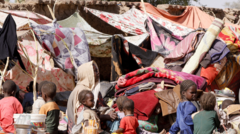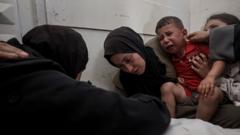Aid agencies report that those fleeing the Zamzam camp in Sudan are resorting to eating leaves and charcoal as they struggle to survive amidst violence and severe shortages of food and water during their perilous journey.
Desperate Times in Sudan: Surviving on Charcoal and Leaves

Desperate Times in Sudan: Surviving on Charcoal and Leaves
An alarming report reveals the dire conditions faced by displaced Sudanese victims fleeing violence in Darfur.
Sudanese people have resorted to consuming leaves and charcoal in a desperate bid for survival after fleeing an attack on a camp for displaced individuals near el-Fasher, according to a report by an aid agency shared with the BBC. Noah Taylor, head of operations for the Norwegian Refugee Council, stated that the stories coming from the ground are appalling, highlighting the struggles faced by those leaving el-Fasher for Tawila. Tragically, many are perishing "on arrival," as the arduous 40-kilometer trek under "blistering" heat takes its toll; reports indicate that bodies can still be found on the route between el-Fasher and Tawila.
A heart-wrenching account shared revealed one girl's harrowing journey: she walked alone from el-Fasher, only to endure multiple rapes before succumbing to her injuries upon reaching Tawila. El-Fasher remains the last major city in Sudan's western Darfur region held by the army and its allies. Earlier this month, the paramilitary Rapid Support Forces (RSF) attacked the Zamzam camp, displacing tens of thousands who had sought refuge there for two decades following prior conflicts.
The ongoing clash between the RSF and the army has claimed tens of thousands of lives and displaced approximately 13 million people over the past two years, leading aid organizations to classify the situation as the world’s most severe humanitarian crisis. The RSF has admitted to attacking the camp but denies any wrongdoing. North Darfur Health Minister Ibrahim Khater confirmed that the Zamzam camp was entirely destroyed in the attack.
Mr. Taylor also expressed concern regarding Tawila's capacity to provide for the sudden influx of displaced individuals. The small town is currently faced with housing between 130,000 to 150,000 people, with critically low supplies of food and water available. Last week, fleeing residents of Zamzam recounted stories of their homes being incinerated and being fired upon during their escape.





















